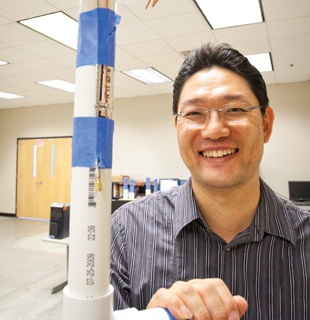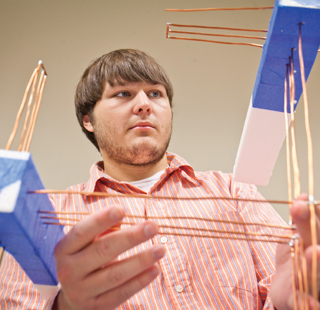Leading Research
Sungkyun Lim, Ph.D., and Graduate Student Cameron Cato (’14)
 Dr. Sungkyun Lim |
The Allen E. Paulson College of Engineering and Information Technology (CEIT) is named in honor of one of Georgia Southern’s most generous benefactors—the founder of Gulfstream Aerospace Corporation. Paulson not only donated $1 million toward construction of the football stadium which bears his name, he also endowed scholarships for the University’s engineering students.
Because of his generosity, faculty and students are able to conduct leading research in the University’s newest college. An example of this is the research underway in CEIT’s Antennas and Wireless Propagation laboratory.
Electrical Engineering Professor Sungkyun Lim, Ph.D., and his team of graduate and undergraduate students share a common goal of turning the lab into a nationally recognized research facility.
“This research is a cutting-edge field of study in that it provides a pathway into the future in the effort to send power wirelessly,” said Lim, who earned his master’s and doctorate degrees in electrical and computer engineering from the University of Texas at Austin. Lim added that antenna design is a unique science and described it as art based on science. Recent research has focused on electrically small antennas for networked wireless communications and sensing applications, including environmental monitoring, intelligent transport systems, and aircraft and satellite systems.
Lim has developed novel design methodologies for electrically small antennas and tested them with digital radios and ad hoc networks in real-world communication environments. He has designed supergain arrays with close spacing between the elements and with electrically small antenna elements.
The professor and his research team are studying how wireless sensors can automatically be charged wirelessly using electromagnetic fields and using electrically small supergain arrays.
Lim said he involves students in his work because it allows them to build their professional careers by presenting at conferences and writing their thesis or journal papers in the field of antennas and wireless propagation.
 Cameron Cato |
One of those students, Cameron Cato (’14) received the Averitt Award, which is the highest honor bestowed within the Jack N. Averitt College of Graduate Studies. Honored for excellence in research, Cato’s research explored a variety of areas including the design of several electrically small antennas and UHF wireless power transfer systems for the remote powering of wireless sensors. What that means, he explained, is simply to “transfer power wirelessly to remote sensors with the goal of eliminating or extending battery life.”
Cato grew up in McDonough, Georgia, and said his fascination with radios and wireless communication began in high school as he pursued his amateur radio operator license. “I started experimenting with antenna design and decided that it would be my profession,” said Cato. “To be able to take a large antenna and to shrink it down to a small package so it is more portable and easy to carry, and to integrate it into a mobile or portable communication platform, is an exciting field of study.”
Because his research involved computer simulation, design, prototyping, and physical measurements, Cato said the top-notch technology in the University’s Laboratory for Antennas and Wireless Propagation provided him with invaluable experience. Lim said Cato always displayed a strong responsibility and willingness to complete projects, even working on them after hours and on weekends. “He always maintained a positive outlook regardless of the amount of work we tended to throw at him,” said Lim.
Cato graduated in May 2014 and acknowledged that he couldn’t have asked for anything more than what he received from the Georgia Southern program. “This department is growing in reputation and from my experience you get a lot of hands-on experience and real-world education that you may not get elsewhere.”
The College of Engineering and Information Technology depends on the support of donors to continue to expand its research opportunities and scholarship funds and to prepare new generations of students for lifelong careers and service.
© Pentera, Inc. Planned giving content. All rights reserved.

